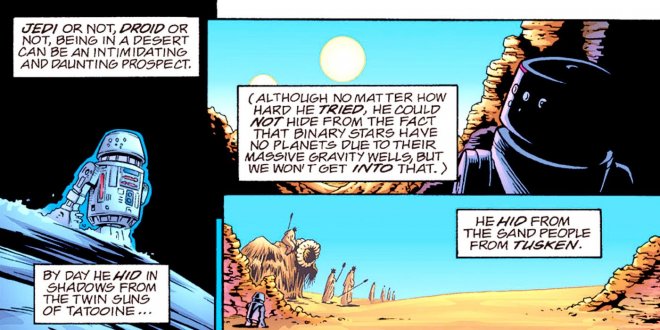
Star Wars creator George Lucas truly was ahead of his time, as a recent scientific discovery confirms the existence of a Tatooine-like planet with twin suns. For decades, the idea of planets orbiting twin suns was seen as something fundamentally impossible. However, history is full of ideas that were thought to be impossible until science proved otherwise, and many of these ideas originate from sci-fi creators like Lucas. The maker ended up being 37 years ahead of science when he created Tatooine, a planet that no longer seems impossible.
Speaking to Space.com, author Matthew Standing elaborated on why planets with twin suns used to seem absurd and how this view was changed by new discoveries.
"Circumbinary planets were originally thought not to exist, since the binary stars stir up the planet-forming disks, creating a harsh environment for planets to form," study lead author Matthew Standing, an astrophysicist at the Open University in England, told Space.com. "This all changed with the discovery of Kepler-16b in 2011 by the Kepler space telescope. This discovery showed that it must be possible for these planets to form."
This eventually led to the recent discovery of BEBOP-1c, "the 2nd-ever known planetary system orbiting twin stars," reaffirming that Lucas was ahead of his time when he created Tatooine for the original Star Wars film.
Science Has Proved Planets Like Tatooine Really Do Exist  Although science has proven that planets like Tatooine do exist, Star Wars has often viewed itself as being non-scientific. In a comedic, non-canon story called "Skippy the Jedi Droid," featured in Star Wars Tales #1, R5-D4 couldn't overlook that "binary stars have no planets due to their massive gravity wells, but we won't get into that.)" Even Star Wars: The Force Awakens director J.J. Abrams adopted this mindset, responding to the seemingly outlandish nature of Starkiller Base by claiming that "The Force Awakens isn't a science lesson." Thanks to the discovery of a Tatooine-like planet, it seems that even Star Wars' most non-scientific aspects may not be impossible after all.
Although science has proven that planets like Tatooine do exist, Star Wars has often viewed itself as being non-scientific. In a comedic, non-canon story called "Skippy the Jedi Droid," featured in Star Wars Tales #1, R5-D4 couldn't overlook that "binary stars have no planets due to their massive gravity wells, but we won't get into that.)" Even Star Wars: The Force Awakens director J.J. Abrams adopted this mindset, responding to the seemingly outlandish nature of Starkiller Base by claiming that "The Force Awakens isn't a science lesson." Thanks to the discovery of a Tatooine-like planet, it seems that even Star Wars' most non-scientific aspects may not be impossible after all.





